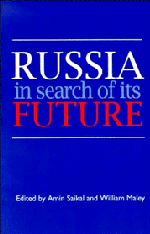13 - Conclusion: Russia in Search of its Future
Published online by Cambridge University Press: 03 May 2011
Summary
Question: What is Socialism?
Answer: Socialism is the longest and most painful path to Capitalism
Six or eight years ago variants of this joke were current throughout the Comecon countries, but few could have guessed the full tragic irony of what they were saying. For it carried the unspoken and often unrecognised assumption that the hardest part of this ‘path’ was the step-by-step roll-back of the dictatorship of the Communist Party, its nomenklatura and its ideology, after which it would be plain sailing all the way to ‘normality’. Few of those who aspired to a democratic free-market society were prepared for the arguably Sisyphean task of entrenching the institutional and legal foundations of such a society through a population unprepared and unskilled (or deskilled) for it. Few grasped the full extent of environmental and health damage bequeathed by ‘real socialism’, the legacy of infrastructure neglect, or the uselessness of much of the ‘real economy’ in a post-Cold War world. Few foresaw the impact of ethnonationalism, of cultural and moral disorientation, or of common criminality unleashed by the collapse of communist quasi-totalitarianism. Not surprisingly, the actual progress of the twenty-odd countries concerned along the path from ‘socialism’ to ‘capitalism’ has varied from the disappointing to the disastrous, and not one of them has yet demonstrated conclusively that the desired goal can in fact be attained.
- Type
- Chapter
- Information
- Russia in Search of its Future , pp. 207 - 225Publisher: Cambridge University PressPrint publication year: 1994



